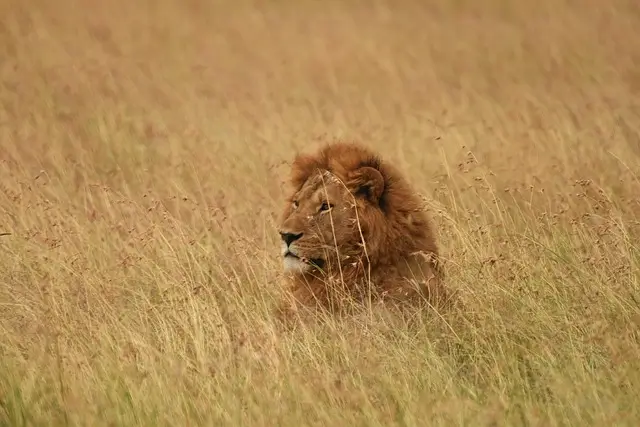Lions symbolize wild Africa, majestic animals that showcase power and beauty. Seeing one in the wild is one of the safari’s ultimate highlights. We collected our facts and out them together ‘5 facts about lions’.
They were the second most widely spread species after humans and can now be found only in sub-Saharan Africa and India. Once ruled over the vast area of Africa and Eurasia, this magnificent beast is now vulnerable.
Lions are often called the ‘King of the Jungle,’ yet lions live in grasslands and savannas, where some cover and plenty of water can be found.
5 FACTS ABOUT LIONS
Lions are among the most iconic animals in the wild. They rule the African savanna with pride—literally and symbolically. In this post, you’ll discover five fascinating facts about lions that reveal their unique social behavior, hunting tactics, and more. Whether you’re a wildlife lover or just curious, these facts offer fresh insight into the lives of these powerful cats.
1. Lions Are the Only Truly Social Big Cats
Unlike tigers or leopards, lions live in groups called prides. These prides can include up to 30 lions. They usually consist of related females, their cubs, and a few dominant males. Living in a pride offers protection and boosts hunting success. This social structure sets lions apart from all other big cats.
The Roar of a Lion Can Travel 5 Miles
A lion’s roar isn’t just loud—it’s legendary. Males roar to warn rivals and communicate with their pride. This sound can travel as far as five miles. It tells others, “This is our territory.” Roaring also helps lions stay connected, especially in the vast African savanna.
Female Lions Do Most of the Hunting
In a pride, lionesses handle most of the hunting. They hunt in groups using smart strategies and stealth. Males usually guard the pride’s territory. This team approach allows them to bring down large prey like zebras or wildebeest. Lionesses are the pride’s true providers.
Lions Sleep Up to 20 Hours a Day
Lions spend most of the day resting. They sleep between 16 to 20 hours, especially during hot weather. This rest saves energy for hunting. Lions usually become active at night or during cooler hours. While they may look lazy, they’re just smart about conserving energy.
A Lion’s Mane Is a Symbol of Strength
Male lions grow thick, shaggy manes as they mature. These manes are more than decoration—they show strength and health. Darker, fuller manes often attract more lionesses. They also intimidate rivals and provide some protection in fights. The mane is a lion’s natural crown.
Read About the Facts About Giraffes
Despite the fantastic 5 facts about lions, we must know one serious fact.
There are about 20,000 lions left in the wild. In 26 African countries, they are already extinct. 90% of the lions’ historical roaming grounds have disappeared. At the expansion rate in Sub-Saharan Africa, it’s estimated that in 2050, lions will be extinct in the wild.
African lion numbers are thought to have declined by over 40% in just three generations.
- The main threats are retaliatory or preemptive killing to protect people and livestock and decreasing natural prey and habitat (for example, due to expanding human settlements and less available grazing). When their natural prey is scarce, lions can cause grave losses to livestock, destroying local people’s income.
- Climate change is another increasing threat – extreme weather may cause more droughts or delay the rains, affecting lions’ prey.
- They’re also killed for the illegal wildlife trade. Recently, the demand for lion bone as a substitute for tiger bone in traditional Asian medicine has risen.
FAQs About Lions
How fast can a lion run?
A lion can reach speeds up to 50 miles per hour. But they can only sprint for short distances.
Do lions live in jungles?
No, lions live in open savannas and grasslands. The phrase “king of the jungle” is just a metaphor.
What do lions eat?
Lions are meat-eaters. They hunt animals like zebras, buffalo, and wildebeests. Sometimes, they also scavenge.
How long do lions live?
In the wild, lions usually live 10 to 14 years. In captivity, they can live beyond 20 years.
Are lions endangered?
Lions are listed as vulnerable. Habitat loss and poaching are major threats to their survival in the wild.
Conclusion: The King Still Rules
Lions aren’t just fierce—they’re fascinating. Their pride system, powerful roar, and majestic mane make them unforgettable. Each fact adds to their legacy as true kings of the wild. While they face serious threats, learning about lions helps us appreciate and protect them. If you’ve ever watched a lion in action, you know—they’re simply unforgettable.
The lion is also an iconic symbol to people all around the world. Many communities in Africa rely on the money from tourism, with lions being one of the biggest attractions.
However, it is known that the ecosystem is changing, but how we do things and respect animals is also in our hands. Are you ready to check out the 5 facts about lions while on your Tanzania safari?




